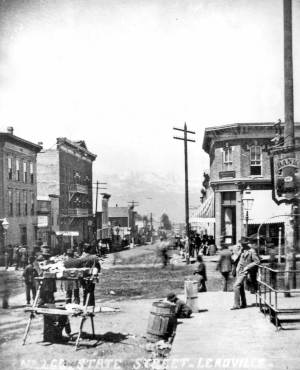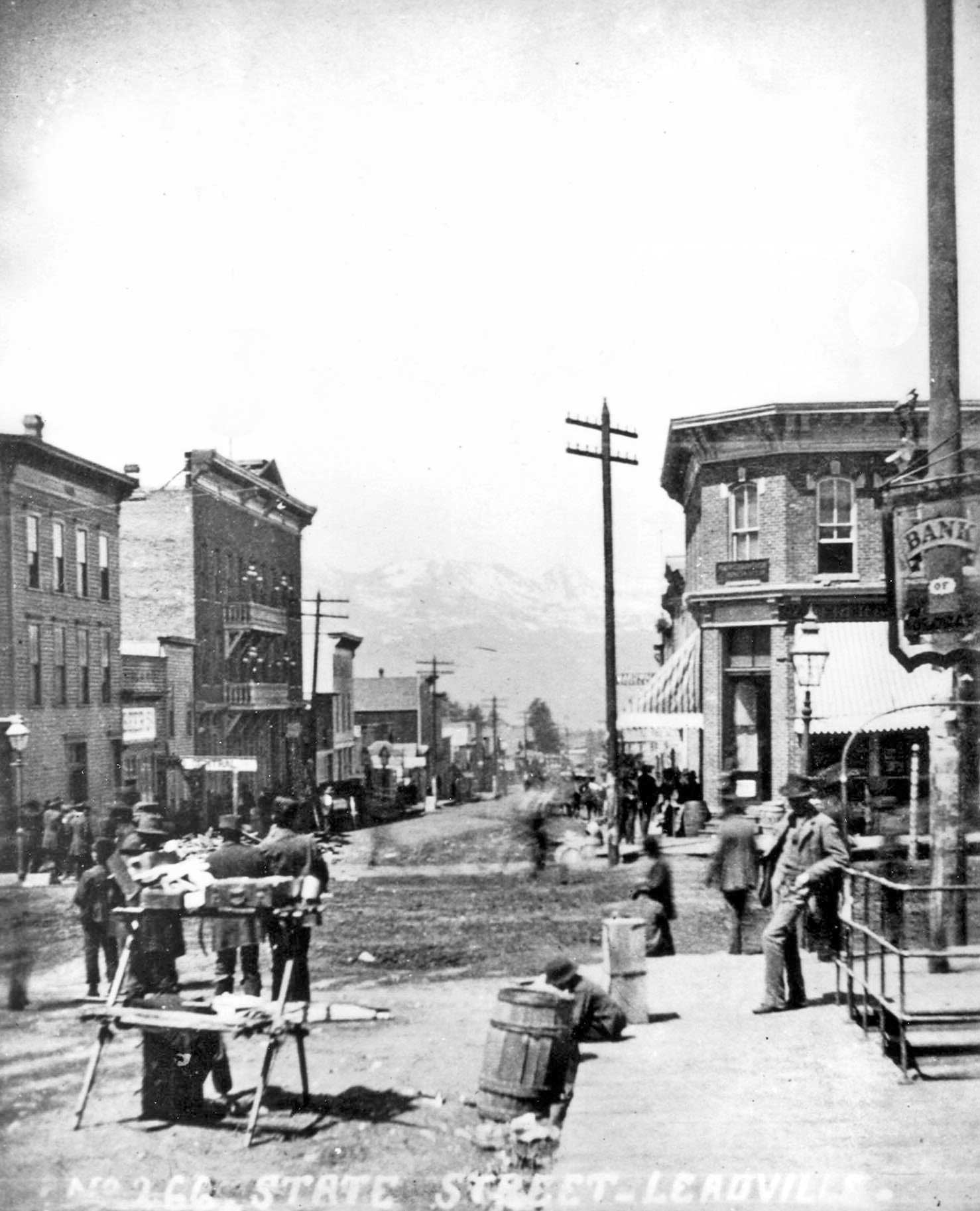By Jan MacKell Collins
It is no secret that prostitutes were some of the most mobile pioneers of the West. The law, family members and lust for money enticed thousands of women to traipse from state to state, town to town, camp to camp. One of the most prominent, well-traveled prostitutes in the West was Mollie May. Born Milinda May Bryant to German and Irish immigrants in about 1850, Mollie was said to have lost her virginity to a “lustful suitor.” By the 1870s, she was working as a prostitute and performer at Jim McDaniels’ Theater in Cheyenne, Wyoming. In 1876, she and McDaniels moved to Deadwood, South Dakota.
The Black Hills Gold Rush and Deadwood were just beginning. In the “Badlands District,” Deadwood’s euphemism for its red-light district, one of Mollie’s admirers was Jim May, a local Black Hills freighter whose brother was the notorious bounty hunter Boone May. Boone and Jim once had an altercation over Mollie at the Gem Theater near the “Badlands.” One brother shot at the other, missed, and hit Mollie instead. Thankfully the bullet hit a steel rib in Mollie’s corset, saving her life.
In her book, Old Deadwood Days, Estelline Bennett describes a similar account of a shoot-out between prostitute Lou Desmond and an unidentified woman. As in Mollie’s story, a bullet struck one of the girls but deflected off her corset. Whether these two events really happened or became a part of one another in the telling is unknown.

It is known for sure that during another skirmish, part of Mollie’s ear was bitten off by another Gem Theater prostitute, Fannie Garretson. The dispute was over “Banjo” Dick Brown, who married Fannie in November 1876. The ear-biting incident apparently happened while Mollie, Fannie and Dick were jaunting along in a closed carriage.
Perhaps the fight with Fannie Garretson made Mollie decide to move to Colorado. Upon her arrival, she almost immediately gained a bad reputation in Silver Cliff and Bonanza for running around with an outlaw named Bill Tripp. She also spent some time in Pueblo, where she became known as the girl of gambler Sam Mickey. Sometimes Mollie went by the name Jennie Mickey.
By 1878, Mollie was in the new boomtown of Leadville. Mollie staked her claim at 555 5th Street in a section of the expansive red-light district. With her was her old friend, Jim McDaniels, who shipped an amazing 40,000 pounds of theater scenery to Leadville and opened a new place called McDaniels’ New Theater.
Mollie did well in Leadville. In 1880 she employed ten girls and two men at her brothel. She also had the only telephone in town. One night, longtime Leadville resident Lewis Lamb “committed suicide” in front of a neighboring bordello. The only witness was a bully Lamb had known from childhood, former marshal Martin Duggan, who had just attempted to run over Lewis with a sleigh he was delivering. It was widely suspected that Lewis had not committed suicide at all, but was actually shot to death by Duggan.
Mindy Lamb, Lewis’ wife, swore revenge on Duggan, promising him: “I shall wear black and mourn this killing until the very day of your death and then, Goddam you, I will dance upon your grave.” The quote was widely circulated, and a few days later Mollie May stopped Mindy on the street. “You don’t know me,” she told Mindy, “but I wanted to tell you that what happened to a decent man like your husband was a dirty rotten shame and I’m really sorry for you.” The women remained friends, often chatting right in front of Mollie’s place.
Also in 1880, Mollie’s old enemy Fannie Brown surfaced. After traveling with Dick Brown during 1878, the couple separated and Fannie – like many other “Black Hillers” seeking greener pastures –wound up in Leadville. In 1879 she performed at McDaniels’ New Theater, an event that reached the newspapers at Deadwood. Perhaps fearing Mollie, Fannie left Leadville shortly after her performance. Mollie also made the papers again when a raid netted seventeen prostitutes on the row and two young men jumped from her second-story window to avoid arrest.
Mollie also had altercations with other prostitutes, including her neighbor, Sallie Purple. The Leadville Democrat reported that the women got into an argument. Insults were exchanged between their brothels, then gunfire. The battle ended two hours later with no injuries. “Both parties are resting on their arms,” chortled the Democrat, “and awaiting daybreak to resume hostilities.”
They say Mollie sold her house in about 1881 to the city, which used it for a city hall. Mollie’s new brothel was among the finest houses in town, and silver millionaire Horace Tabor was rumored to be a silent partner. Mollie continued dealing with the everyday issues of her profession. In 1882, she charged Annie Layton with stealing a dress. The argument escalated in court when Annie accused Mollie of running a house of ill fame, and Mollie retaliated by revealing that Annie was employed as a prostitute. Ultimately, all charges were dropped.
Next, Mollie became the subject of yet another scandal when news circulated that she was buying a nine-month-old baby named Ella from a couple known as Mr. and Mrs. Moore. The madam stayed silent until a local newspaper voiced concerns about her intentions. In May, Mollie contacted the Leadville Herald and gave an exclusive interview, explaining that the child belonged to a decent woman who was too poor to care for her. Mollie was caring for the baby until the mother could contact relatives for assistance. She ended the interview by angrily reminding the general public of all the charities she donated to on a regular basis.
Despite Mollie’s claim, Ella’s mother never reclaimed her child and Mollie adopted her. She was called Ella Moore, even though Mollie said the Moores were not the child’s parents. As soon as she reached school age, Ella was sent off to St. Scholastica’s Institute in Highland, Illinois. Her guardian was listed as one Robert Buck.
Mollie May died April 11, 1887 from what the Leadville Weekly Chronicle called “neuralgia of the heart.” Her funeral was one of the largest processions in Leadville, and even Mindy Lamb insisted on attending. The services took place in Mollie’s brothel before a $3,000 hearse and eight carriages accompanied Mollie to Leadville’s Evergreen Cemetery. Her obituary, which circulated as far away as Pueblo, stated, “She was a woman who, with all her bad qualities, was much given to charity and was always willing to help the poor and unfortunate.”
Mollie’s estate was valued at $25,000, with $8,000 in diamonds. Her personal property sold for $1,500, and her house was purchased by one Anna Ferguson for $3,600. The papers speculated the money would go to six-year-old Ella Moore, but little else is known about the child. In 1901, the Leadville Herald published an article about 20-year-old Lillian Moore, adopted daughter of Mollie May, who attempted suicide in Leadville. Doctors saved her life and she was last seen on a train headed to Denver where, like so many others, she disappeared without a trace.
Jan MacKell Collins is an author and historian who writes about the West. She currently lives in Arizona and is working on a new book about prostitution history in Prescott.




